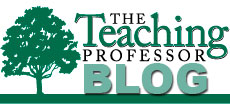Does your institution have a policy that addresses bullying? If it does not, there are some pretty compelling reasons to consider creating such a policy. In an interview with Academic Leader, Suzanne Milton, chair of the faculty bargaining unit at Eastern Washington University, talked about bullying and its consequences, and ways to address it to create a workplace more conducive to getting work done without a lot of problems.
Read more ›CURRENT ARTICLE • June 28
OTHER RECENT ARTICLES
 I’ve been doing some presentations on classroom interaction and thinking yet again about how we could do better with our questions — the ones we ask in class or online. Good questions make students think, they encourage participation and I think they improve the caliber of the answers students give and the questions they ask. To achieve those worthwhile outcomes more regularly, I’d like to recommend three actions that have the potential to improve our questioning.
I’ve been doing some presentations on classroom interaction and thinking yet again about how we could do better with our questions — the ones we ask in class or online. Good questions make students think, they encourage participation and I think they improve the caliber of the answers students give and the questions they ask. To achieve those worthwhile outcomes more regularly, I’d like to recommend three actions that have the potential to improve our questioning.
 Promoting reflection is a goal endorsed by many faculty. They believe that students need to develop skills that will enable them to look at a piece of work they produce or an aspect of their professional practice and make accurate judgments about it. It’s not an easy skill to acquire, and practice is essential to its development. If teachers are giving students opportunities to reflect, they need to be able to assess how well students are reflecting and provide feedback that deepens the students’ skills.
Promoting reflection is a goal endorsed by many faculty. They believe that students need to develop skills that will enable them to look at a piece of work they produce or an aspect of their professional practice and make accurate judgments about it. It’s not an easy skill to acquire, and practice is essential to its development. If teachers are giving students opportunities to reflect, they need to be able to assess how well students are reflecting and provide feedback that deepens the students’ skills.
The general consensus among most faculty members is that regular class attendance helps students learn and retain the course content more effectively. According to Park & Kerr (1990), research demonstrates that the lack of attendance was statistically significant in explaining why a student received a poor grade.
Read More ›Slides, even with text and graphics on them, aren’t particularly as good as instructional content because someone needs to explain what’s on each slide. You are still the presenter and you should explain, right? (Right.)
Read More › “I just don’t see how students learn anything when they talk to each other,” a faculty member told me recently. “Their conversations are so superficial. They get things wrong. I can hardly stand to listen to them.”
“I just don’t see how students learn anything when they talk to each other,” a faculty member told me recently. “Their conversations are so superficial. They get things wrong. I can hardly stand to listen to them.”
One of the messages of the Writing Across the Curriculum movement is that writing skills can be developed in any course and that often the best place to start is with current assignments that involve writing. That’s where chemists Gragson and Hagen started. They were disappointed in the quality of student writing in their “journal-style” lab reports. Despite giving students a sample lab, a writing manual, and lots of good feedback, the quality of the lab reports was low and did not improve across the 10 to 15 lab reports students prepared.
Read More ›“Learning is not a spectator sport. Students do not learn much just by sitting in class listening to teachers, memorizing prepackaged assignments, and spitting out answers. They must talk about what they are learning, write about it, relate it to past experiences, apply it to their daily lives. They must make what they learn part of themselves.”
– A. Chickering and Z.F. Gamson, “Seven principles for good practice,” AAHE Bulletin 39 (March 1987), 3-7.
“Creating a climate that maximizes student accomplishment in any discipline focuses on student learning instead of assigning grades. This requires students to be involved as partners in the assessment of learning and to use assessment results to change their own learning tactics.” (p. 136) The authors of this comment continue by pointing out that this assessment involves the use of formative feedback and that feedback has the greatest benefit when it addresses multiple aspects of learning. This kind of assessment should contain feedback on the product (the completed task) and feedback on progress (the extent to which the student is improving over time). The article then describes a number of formative feedback activities that illustrate how students can be involved as partners in the assessment process. Their involvement means that formative feedback can be given more frequently.
Read More ›Keith Restine, associate director of distance education, and Allison Peterson, senior instructional designer, both at Texas Woman’s University, offer the following tips for reducing instructor workload in discussion forums:
Read More ›




